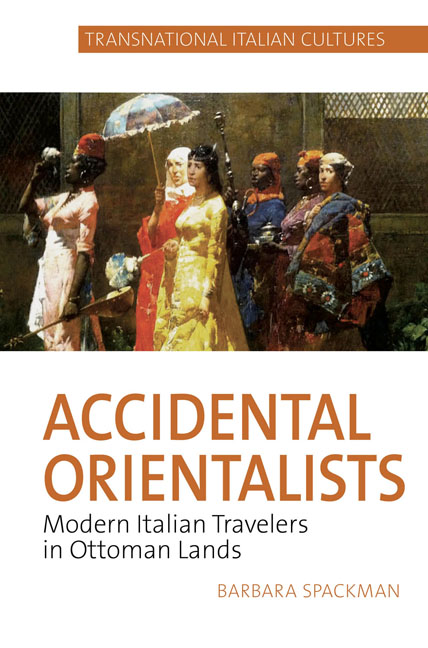Book contents
- Frontmatter
- Contents
- List of illustrations
- Acknowledgements
- Preface
- Chapter One Detourism: The Orientalism of Amalia Nizzoli's Egyptian Memoirs
- Chapter Two Hygiene in the Harem: The Orientalism of Cristina Trivulzio di Belgiojoso
- Chapter Three Male Masquerade in Mecca: Passing and Posing in Nineteenth-Century Egypt
- Chapter Four Muslim in Milan: The Orientalisms of Leda Rafanelli
- Epilogue Divorce Islamic Style: Passing and Posing as Muslim and Tunisian in Postcolonial Italy
- Works Cited
- Index
Epilogue Divorce Islamic Style: Passing and Posing as Muslim and Tunisian in Postcolonial Italy
- Frontmatter
- Contents
- List of illustrations
- Acknowledgements
- Preface
- Chapter One Detourism: The Orientalism of Amalia Nizzoli's Egyptian Memoirs
- Chapter Two Hygiene in the Harem: The Orientalism of Cristina Trivulzio di Belgiojoso
- Chapter Three Male Masquerade in Mecca: Passing and Posing in Nineteenth-Century Egypt
- Chapter Four Muslim in Milan: The Orientalisms of Leda Rafanelli
- Epilogue Divorce Islamic Style: Passing and Posing as Muslim and Tunisian in Postcolonial Italy
- Works Cited
- Index
Summary
Two centuries after the cases we examined in Chapter 3, the Italian–Algerian writer Amara Lakhous reprises the topoi of passing and posing as Muslim in his 2010 novel Divorzio all'islamica a Viale Marconi [Divorce Islamic Style]. No longer primarily the point of departure for emigrating Italians, but rather the destination for immigrants – many of them Muslims from north Africa – contemporary Italy is now the locus of multiple migrations. Divorce Islamic Style explores the imbrication of these migrations with Orientalisms, both internal and external, and thus offers itself both as an epilogue to our examination of accidental orientalists and as a source of yet more reversals. No longer a stage external to Europe, the “Orient” in Divorce has been internalized as the multicultural call center in “Little Cairo,” locus of the novel's action and site where the protagonist Christian takes on his new identity as the Muslim Tunisian “Issa.” “Christian” in both religion and proper name, the protagonist is a Sicilian who studied classical Arabic at the University of Palermo and who, in 2005, is recruited by SISMI (Servizio per le Informazioni e la Sicurezza Militare) as part of Bush's “War on Terror.” His assignment: to impersonate a Muslim Tunisian immigrant and infiltrate a purported terrorist cell in the Roman neighborhood known as “Little Cairo,” home to an immigrant community made up largely of Egyptians and other north Africans. Both setting and characters contribute to a layering of migrations: Christian's true family origins link him to southern Italian emigration to Tunisia, and the topic of his tesi di laurea – Garibaldi's sojourn in Tunisia – in turn links that emigration to the Risorgimento and its making of Italian identity. The embedding of “Cairo” within an Italian city recalls yet other Mediterranean exchanges, both historically and geographically; the name “Cairo” itself is in fact the Italianization, on the part of travelers in the Middle Ages, of the original Arabic name of the city, al-Qāhira, and, as noted in Chapter 1 of this book, Cairo and Alexandria were home to immigrant communities of Europeans in general, and Italians in particular, in the wake of the Napoleonic occupation (1798–1801).
- Type
- Chapter
- Information
- Accidental OrientalistsModern Italian Travelers in Ottoman Lands, pp. 211 - 223Publisher: Liverpool University PressPrint publication year: 2017



